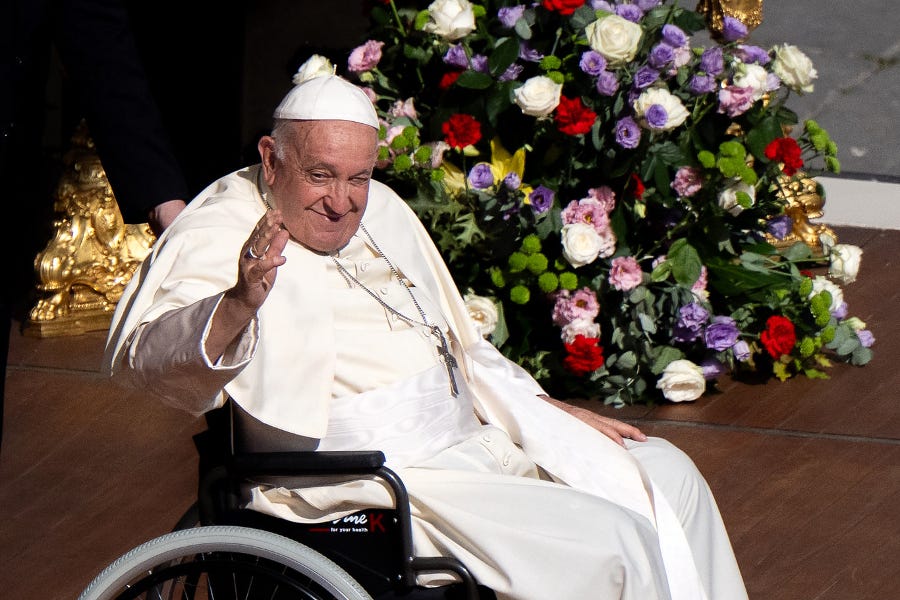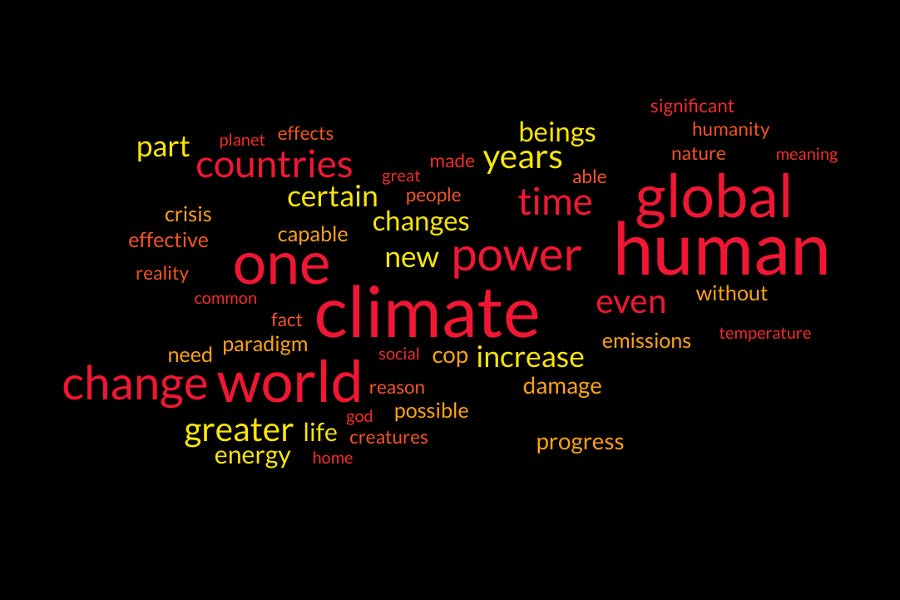
‘Laudate Deum’: A brief guide for busy readers
Pope Francis’ new apostolic exhortation is an urgent sequel to his 2015 encyclical Laudato si’.
The world is not moving fast enough to mitigate the devastating effects of climate change, Pope Francis said Wednesday.

Writing in his new apostolic exhortation Laudate Deum (“Praise God”), released on the Oct. 4 feast of St. Francis of Assisi, the pope said the planet was approaching a “point of no return” as global warming hurtled toward the maximum recommended limit of 1.5 degrees Celsius (2.7 Fahrenheit) higher than the pre-industrial average.
“Even if we do not reach this point of no return, it is certain that the consequences would be disastrous and precipitous measures would have to be taken, at enormous cost and with grave and intolerable economic and social effects,” he wrote.
“Although the measures that we can take now are costly, the cost will be all the more burdensome the longer we wait.”
While that is the text’s headline message, the document — a sequel to Francis’ 2015 encyclical Laudato si’ — contains much else besides. Here’s a brief guide for busy readers.
It’s short
The first thing to note is that Laudate Deum is strikingly short for a document in the Pope Francis era.
The exhortation clocks in at around 8,000 words, compared to the 40,000 words of Laudato si’ and the 60,000 words of the gargantuan 2016 apostolic exhortation Amoris laetitia. It can be read comfortably in half an hour.
Why ‘Praise God’?
The document’s opening words — or “incipit” in Latin — relate to St. Francis of Assisi, the patron saint of ecology.
“‘Praise God for all his creatures,’” Laudate Deum begins. “This was the message that St. Francis of Assisi proclaimed by his life, his canticles and all his actions.”
Unlike Laudato si’, which began with a direct quotation from St. Francis’ “Canticle of the Creatures,” Laudate Deum appears to start with a paraphrase seeking to capture the spirit of the saint’s work.
A Google search for the phrase “praise God for all his creatures” brings up a Sept. 1, 2019, Angelus address, in which Pope Francis said: “From today until Oct. 4, the Feast of St. Francis of Assisi, it is a favorable time to praise God for all his creatures and to assume responsibility before the cry of the Earth.”
In a striking editorial choice, readers must wait until Laudate Deum’s final paragraph for a direct explanation of why the text is entitled “Praise God.”
“‘Praise God’ is the title of this letter,” Francis writes. “For when human beings claim to take God’s place, they become their own worst enemies.”

Tackling skeptics
In Laudate Deum, Pope Francis goes into battle with people who he believes downplay or deny outright the severity of the threat posed by climate change.
He devotes 10 paragraphs to rebutting common objections, such as that the world has historically experienced periods of cooling and warming, and that steps to protect the environment will destroy jobs.
“I feel obliged to make these clarifications, which may appear obvious, because of certain dismissive and scarcely reasonable opinions that I encounter, even within the Catholic Church,” he notes.
“Yet we can no longer doubt that the reason for the unusual rapidity of these dangerous changes is a fact that cannot be concealed: the enormous novelties that have to do with unchecked human intervention on nature in the past two centuries.”
A sense of urgency
There’s a notably urgent tone throughout Laudate Deum. Eight years on from the publication of Laudato si’, Francis believes that the world has largely failed to rise to the challenges he outlined in the encyclical.
He writes that “with the passage of time, I have realized that our responses have not been adequate, while the world in which we live is collapsing and may be nearing the breaking point.”
The “technocratic paradigm” that he deplored in Laudato si’ has continued to wreak havoc. “Artificial intelligence and the latest technological innovations start with the notion of a human being with no limits, whose abilities and possibilities can be infinitely expanded thanks to technology,” he says. “In this way, the technocratic paradigm monstrously feeds upon itself.”
Meanwhile, he believes that the international consensus needed to combat climate change remains weak. He offers a detailed critique of recent United Nations climate change conferences, seeing them broadly as failures, with the possible exception of the 2015 edition in Paris, which produced an agreement that observers believe was influenced by the publication of Laudato si’.
The pope looks ahead to the next conference, which will be held Nov. 30-Dec. 12 in the United Arab Emirates. He seems unenthusiastic about the venue, noting that the UAE is “known as a great exporter of fossil fuels,” and oil and gas companies are planning new projects in the country.
But despite his sadness at the ineffectiveness of global institutions, he insists that “to say that there is nothing to hope for would be suicidal, for it would mean exposing all humanity, especially the poorest, to the worst impacts of climate change.”
Criticism of the U.S.
Pope Francis cites a 2019 U.S. bishops’ document on climate change approvingly in Laudate Deum’s third paragraph.
But elsewhere, he suggests that the U.S. is one the main culprits of the climate crisis.
“If we consider that emissions per individual in the United States are about two times greater than those of individuals living in China, and about seven times greater than the average of the poorest countries, we can state that a broad change in the irresponsible lifestyle connected with the Western model would have a significant long-term impact,” he writes.
Footnote curiosities
Laudate Deum’s footnotes consist largely of references to other texts of the Francis pontificate, principally Laudato si’. They also amply cite documents produced by the UN’s Intergovernmental Panel on Climate Change (IPCC).
The exhortation alludes to the 2008 book “When Species Meet,” by the U.S. professor Donna Haraway, which explores the notion of “companion species.”
But perhaps the quirkiest reference is to the Russian writer Vladimir Solovyov’s apocalyptic “A Short Story of the Anti-Christ.”
The story, published in 1900, imagines the emergence of an Antichrist who establishes himself as a global authority and seeks dominion over Christians worldwide, but faces heroic resistance from Church leaders and is ultimately vanquished by Christ.
The pope doesn’t delve into the story’s plot in Laudate Deum, but limits himself to quoting Solovyov’s “ironic comment” about an “age which was so advanced as to be actually the last one.”
Editor’s note: This report was updated Oct. 4, 2023, with a word cloud of terms in “Laudate Deum.”










Anyone else see the irony of the Holy Father denouncing technocracy while the climate agenda is simultaneously advanced and championed primarily by secular, global technocrats?
Interesting that he slags America when in 2022 China issued 82 site permits for [checks notes] new coal burning electrical generation plants.